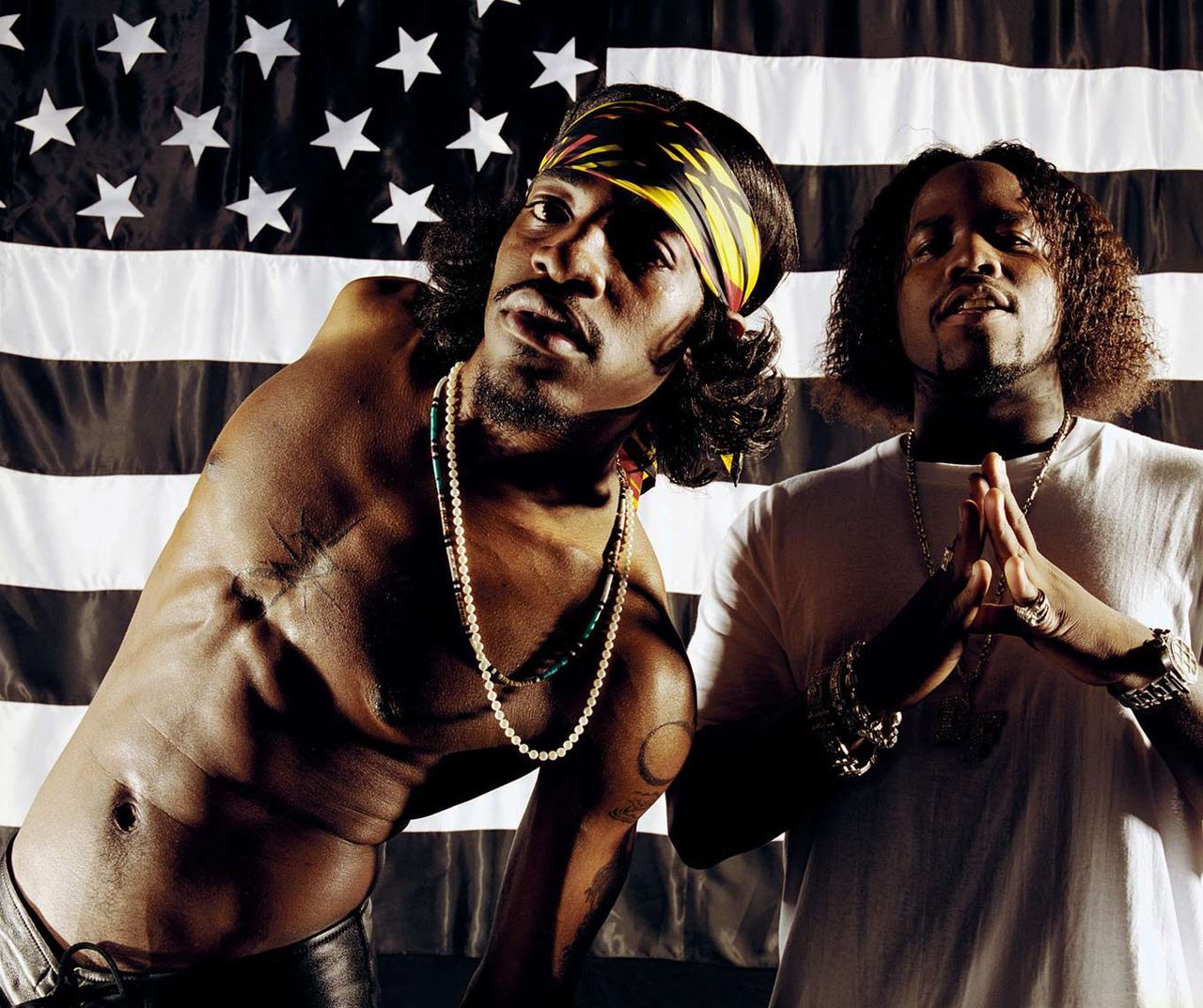Male Hip Hop
Outkast

In the early 1990s Hip-Hop was still almost entirely defined in East Coast/ West Coast terms. No southern rap acts had been able to sustain prolonged national success. To breakthrough, the newly named Outkast would need some luck to realize all their prodigious talents. After making their debut on an Organized Noize-produced remix of TLC’s “Friends,” Outkast caught the attention of Perri “Pebbles” Reid of Pebbitone Records who convinced her husband, L.A Reid, to sign them to the almost exclusively R&B label LaFace Records. Outkast’s debut song “Player’s Ball” was oddly placed on A LaFace Family Christmas compilation album in 1993.
Outkast’s blend of gritty Southern soul, fluid raps, and the low-slung funk of their production crew epitomized the Atlanta wing of hip-hop’s rising force, the Dirty South, during the mid to late ’90s. Outkast took Southern hip-hop in bold and innovative directions: less reliance on aggression, more positivity and melody, thicker arrangements, and intricate lyrics. After Andre 3000 and Big Boi hit number one on the rap charts with their first single, “Player’s Ball,” the duo embarked on a run of platinum albums spiked with several hit singles, enjoying numerous critical accolades in addition to their commercial success.
Perfectly capturing southern city culture, and paired with a soulful groove and Sleepy Brown’s Curtis Mayfield inspired hook, “Player’s Ball” dominated Atlanta Radio. The accompanying video, directed by Sean “Puffy” Combs, did for Outkast what Nuthin’ But a G Thang did for Dr. Dre and Snoop. Atlanta’s combination of grit and flair culture were front and center, while showcasing the chemistry between Big Boi and André. On March 26, 1994 “Player’s Ball” shot to #1 on Billboard Hot Rap Songs, and peaking at #37 on Billboard Hot 100 charts. Dre and Big Boi were instant stars and Face Records released Outkast’s first studio album SouthernPlayalisticCadillacMuzik on April 26, 1994. A movement was born. Outkast’s debut album would receive universal praise as a hip-hop classic, as the album certified platinum a year after its release.
In 1996, Outkast released their sophomore album ATLiens, exploring internal themes of Afro- centric science fiction while celebrating Atlanta’s culture of cruising the streets in classic cars with booming speakers rattling trunks. André and Big Boi took a more hands on role in crafting the sound, personally producing their first single “Elevators (Me & You).” André began incorporating poetic verse and ditching baseball jersey and baggy jeans for head scarves and linens, while Big Boi embraced more pimp culture and fur coats. Speaking as adults, the duo honestly portrayed the trials of fame and notoriety. ATLiens went platinum within four months of its release and would be certified double platinum in 2003.
1998’s album Aquemini, a portmanteau of their zodiac signs, (Patton an Aquarius, Benjamin a Gemini) was perfectly named as the duo’s individual personalities became more pronounced. Big Boi fully embracing 70s funk stylings and zoot suits, where André began experimenting with wigs, colorful clothing and outlandish accessories giving Outkast a distinctive visual style. With the passing of 2Pac and the Notorious B.I.G., acts like Jay-Z, Lauryn Hill and Outkast stepped up to fill the void at the top of the rap food chain. Aquemini debuted at no.2 on the Billboard charts, and attained the coveted 5 mics rating from The Source. André and Big Boi produced most of the tracks on the album, including the controversial, Grammy-nominated “Rosa Parks” where the civil rights icon sued the group over use of her name.
In 2000, Outkast released Stankonia. Zigging when everyone expected them to zag, the duo created a more percussive album, emphasizing synth, electric guitar and harder kicks from the drum machine. Stankonia achieved gold status its first week. Involving more collaborations with guest artists like Killer Mike, Goodie M.O.B. and young southern rappers, André, now adding “3000”, chose to use his voice more as a singer and mix in the rap where appropriate, a forebearer of things to come. “Ms. Jackson” peaks at #1 in Feb. 2001, and won the Grammy for Best Rap Performance by a Duo or Group, and drove Stankonia to win the Grammy for Best Rap album, and certified 5x’s Platinum in 2020.
At the turn of the millennium, the Atlanta music scene was stronger than ever, as the city’s popularity was peaking. The time had come for André to capitalize on all his gifts and talents. With André’s desire to rap waning, Outkast’s next dual-album would feature two separate artistic visions from Big Boi and André 3000. With André assisting with production, Big Boi’s Speaker Boxx delved deeper into the horn play and “electro-thump” sound of Stankonia, whereas André’s The Love Below pushed the dual album in another stratosphere. André’s first #1 single “Hey Ya!” took America by storm. SB/TLB was Outkast’s only album to certified diamond and 11 times platinum selling 11 million units in the SoundScan era. Outkast cleaned up at the 2004 Grammys with 6 nominations. “Hey Ya!” won Best Urban/Alternative Performance and SB/TLB won Best Rap Album and an historic Album of The Year, a first for a predominantly Hip-Hop group.
In 2014, Outkast returned to the live stage, headlining the Coachella Valley Arts and Music Festival to celebrate the 20th anniversary of the release of Southern PlayalisticCadillacMuzik. The accompanying 40 date summer festival tour gave millions of fans a chance to see the duo perform Speakerboxx/The Love Below, and relive the magic of the 90s and early 2000s. The end of the tour culminated in a three night “ATL Homecoming” reunion performance in Atlanta’s historic Centennial Olympic park. Outkast brought back Dungeon Family artists and featured different Atlanta-based artists, including Childish Gambino, and re-established their dominance as kings of the South.
